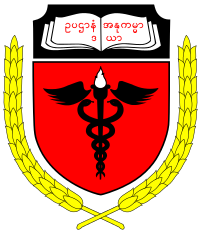Department of Preventive And Social Medicine
The University of Medicine, Magway
Give us a call
11111111
DEPARTMENTAL OBJECTIVES of Department of Preventive and Social Medicine, UMMG
At the end of an academic year, a Final Part I MB,BS student should be able to :
- CONGITIVE
- explain the concept of health and approved mechanisms for total health care of communities.
- describe the principles of general epidemiology, prevention and control of diseases.
- describe the prevention and control of diseases prevalent in Myanmar based upon their epidemiological features.
- describe the significance of environmental sanitation as related to prevention and control of diseases.
- describe the Health Services Organization and its activities in Myanmar and propose measures to improve them.
- describe the discuss the content and scope of National Health Plan in the context of National Health Policies.
- identify special risk groups and describe the services available for them.
- describe the principles and methods of educating the public on matters relating to health and disease.
- describe the quantitative techniques and commonly used indicators for assessment of health.
- outline the principles involved in monitoring and evaluation of health programmes.
- describe the management of situations associated with mass movement and congregation of people as in national disasters, fairs and festivals.
- discuss the concept and practice of Community Medicine.
- describe the structure and functions of social welfare services in Myanmar.
- recognize voluntary nongovernmental organizations and international agencies and their role in contributing to the health sectors.
(B) AFFECTIVE
- appreciate comprehensive health care as inclusive of promotive, preventive, curative and rehabilitative measures in relation to physical, mental and social factors.
- conceive that preventive measures are often more productive than other measures in the long run. This is assessed by the ability to undertake a balanced mix of comprehensive medicine.
- appreciate the importance of preventive and social medicine by taking into consideration the preventive and social factors in management of clinical cases.
- extend his thinking by looking beyond the clinical case into the likely situation in the community through surveillance procedures.
- realize the significance of the team approach, in which he is the leader, by working harmoniously with members of his team.
- recognize the role of non-health sectors by involving them in overall health development programmes.
- conceive that active involvement of the community is the key approach for successful implementation of health programmes. The extent of conviction is to be assessed by the enthusiasm with which he identifies himself with the community during the course of field training.
- maintain an inquiring mind as demonstrated by his willingness to initiate and carry out research activities.
(C) PSYCHOMOTOR
- plan conduct and manage priority health priority health programmes as outlined in the National Health Plan.
- perform correctly under guidance various activities for diagnosis of community health problems.
- elicit and present relevant social history of patients in addition to routine clinical history taking with the aim of instituting social therapy if indicated.
- organize and conduct health education programmes in divergent situations.
- perform correctly simple sanitation procedures such as rodent control measures; chlorination of a shallow well; sanitary inspection of factories, bazaars, food stalls, latrines and houses.
